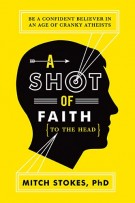 Mitch Stokes, A Shot of Faith to the Head: Be a Confident Believer in an Age of Cranky Atheists (Nashville: Thomas Nelson, 2012). $16.99, 252 pages.
Mitch Stokes, A Shot of Faith to the Head: Be a Confident Believer in an Age of Cranky Atheists (Nashville: Thomas Nelson, 2012). $16.99, 252 pages.
Is belief in God irrational? Does science show that God doesn’t exist? Does evil?
Over the past decade, New Atheists such as Richard Dawkins, Daniel Dennett, Sam Harris, Christopher Hitchens, and Victor J. Stenger have answered these questions affirmatively. Their best-selling books have promoted the ideas that Christian faith is based on insufficient evidence; that in light of scientific advances, God is a “failed hypothesis”; and that suffering—when not actively caused by believers—disproves God’s existence.
Stokes disagrees. Building on the philosophical insights of Alvin Plantinga (who blurbs the book), Stokes argues that theistic belief is rational, that science points to a designed universe (and where there’s a design, there’s a Designer), and that the problem of evil actually points to an incoherence in atheism (for how can there be moral law without a Moral Lawgiver?). One-sentence summaries don’t do justice to the nuances of Stokes’s arguments, but they point in the right general direction.
Although New Atheists can read this book with profit, its subtitle points to Stokes’s intended readers, namely, Christians. He aims to help them “be a confident believer in an age of cranky atheists” (and I would’ve added, “atheist cranks”). It is less a book of apologetics, then, than a book aboutapologetics. And that’s a shame, for the Christian book market is saturated with apologetics books written for Christians, and Stokes writes clearly and winsomely enough to directly engage nonbelieving readers. Nevertheless, the book is still worth reading, if only for its discussion of evidentialism.
In epistemology, evidentialism is the notion that, “to be rational, a belief must be supported by sufficient evidence.” The “evidentialist objection” to theistic belief is that it “is not supported by sufficient evidence and therefore is not rational.” Some Christian apologists subscribe to evidentialism and think Christianity crosses the evidentialist threshold for rationality. Following Plantinga, however, Stokes argues that evidentialism itself is self-defeating, since the chain of evidence for it—or for any other belief—will be circular or infinitely regressive, or will terminate in a basic belief that requires no further evidence. Since circular reasoning and infinite regresses do not produce knowledge, for evidentialism to work, it must be grounded in a basic belief, a belief which requires no evidence. Which means that evidentialism is a belief that doesn’t have sufficient evidence. Obviously, that’s a problem for evidentialism.
Thankfully, there’s a better way to understand rationality. Again, following Plantinga, Stokes argues that “a rational belief is one formed by a properly functioning cognitive faculty operating in the appropriate environment.” If, for example, my eyes are working properly and there is enough daylight for me to see clearly, I will form the belief, when I look out my window, that there are cars parked outside my office building. I don’t need to infer this belief from other beliefs or provide a chain of evidence for it. Such a perception is a basic belief. There are many other kinds of beliefs that are basic in this way: beliefs formed on memory, for example, or testimony or personal experience. Perhaps, Stokes argues (again following Plantinga), belief in God is also such a basic belief that doesn’t need an argument, let alone “sufficient evidence,” to render it rational for the believer.
As Stokes point out, basic beliefs have potential “defeaters.” Perhaps, for example, my perception of cars in the parking lot below has been caused by a holograph that my coworkers pasted to my windows. Stokes interprets science and evil as potential defeaters for belief in God, but offers arguments for thinking that both potential defeaters are unsuccessful, based on the design of the universe and existence of a moral law. While a believer can be rational in the absence of such arguments or evidences for faith, Stokes nonetheless thinks arguments can be helpful in clearing away objections and in shoring up a Christian’s faith.
How, then, should a Christian use this book? In two ways, one intended by Stokes and another not. The intended way is as a manual in Christian apologetics. The unintended way is as an introduction to Alvin Plantinga’s epistemology and philosophical theology. Either way, I highly recommend this book to Christian readers.
P.S. If you found this review helpful, please vote “Yes” on my Amazon.com review page.

